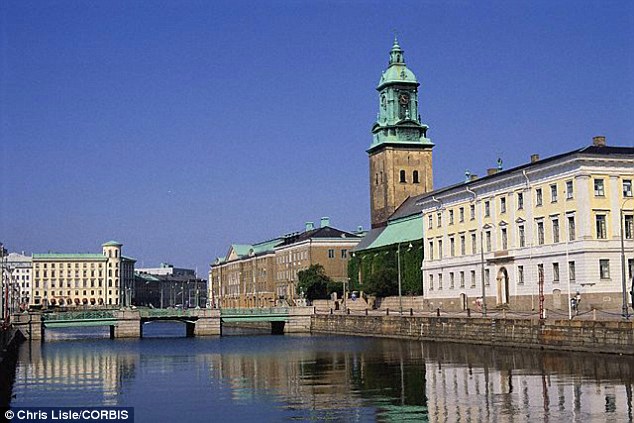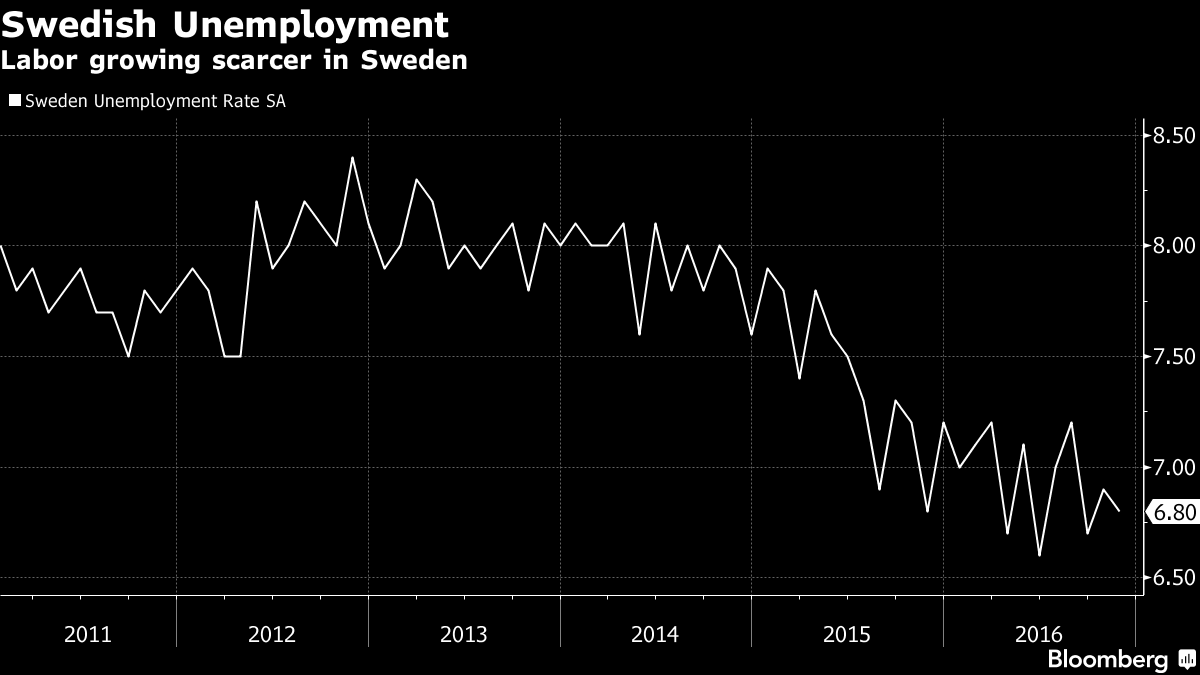In Sweden, abolish the six-hour working day: not everything is as rosy as it seemed

Gothenburg
In October 2015, at Geektimes, and in other media, information began to appear that more and more Swedish companies are introducing a six-hour working day for their employees. At the same time, it was asserted that the management of the companies, and the employees themselves, do not observe a decrease in work efficiency. In some cases (although it wasn’t exactly what), efficiency even increased. In other words, it was about the fact that employees of companies where a 6-hour working day was introduced manage to do as much as employees of other companies for a full 8-hour day.
“It seems to me that the 8-hour working day is not as effective as many people think,” said Linus Feldt, CEO of the mobile application development company, Filimundus. - Focusing on work for eight hours is extremely difficult. We have to intersperse the work with something for a change. It becomes difficult to deal with personal life, to spend time with family. ” But it seems that everything turned out to be not so rosy, since now all the same Swedish companies are gradually canceling the six-hour regime, re-introducing the usual and usual eight-hour working day.

Yes, they would also like to work 6 hours a day ... but it didn't work out
')
Interestingly, previously many supporters of the six-hour working day argued that the idea that a person can work effectively for eight hours is wrong. But with a six-hour working day, people feel a surge of enthusiasm and are laid out at all 150%, while the employees of the "six-hour" companies are less in conflict with each other and feel more satisfied with life. Studies conducted by researchers from OECD countries have shown that people who work more than 50 hours a week have a higher incidence rate than people who work on a regular or reduced schedule. After analyzing the data of 600,000 respondents, it turned out that the risk of coronary heart disease in workaholics increases by about 13%, and the risk of stroke - by 33%. In women, a large amount of work leads to depression (in men, too, but in women, depression in this case happens more often).
However, even with a shortened working day, not everything is as rosy as it seemed. For example, in one of the state-owned companies, which for two years conducted an experiment with a change in the length of the working day, state that the six-hour mode is too expensive. This is an old-age care clinic from Gothenburg. This state-owned company has introduced a six-hour working day, considering that the staff feels in this case more positively, more effectively looking after their wards. A few months after the introduction of the new regime, the management of the organization stated that the quality of services had really improved, since the employees did not get tired much, and their enthusiasm increased.
The city administration said that there are no plans to scale up the experience of this clinic. Moreover, it is highly likely that employees will soon switch to a normal eight-hour day. The problem is that during the experiment it was necessary to significantly increase the cost of staff. In order to compensate for the reduction in the work time of 68 employees of this organization, another 17 people had to be hired, which cost the city budget an additional $ 1.3 million.
“All this is associated with high costs. This is too expensive to reduce working hours at other organizations in the foreseeable future, ”said Daniel Bernmar, a local official who is responsible for caring for the elderly residents of the city.

Not only money
The report of the clinic management from Gothenburg shows that the problems are not only in additional financial costs and hiring additional staff. In the same clinic for the care of older people, the incidence rate of employees increased from 8% to 9.3%. The hospital medical staff was not too pleased with the changes. So, only 20% of employees showed satisfaction that their working day was reduced. In another company in the same city, employees began to ask about vacation time or time off about three times more often, and sick leave began to happen twice as often.
Why? The fact is that the working day has been reduced, but the amount of work is not. Employees have to do the same job in a shorter time, which leads to too high workload, stress and, consequently, morbidity and dissatisfaction with life.
The experiment in Gothenburg is the last of a series of similar ones. Experts and journalists from around the world were closely watching the experiment of the Swedes. The results of this experiment could change a lot, because if labor efficiency had increased without additional costs, then officials from other countries in Europe and the USA would undoubtedly realize similar plans.
Some Swedish politicians are sure that the system with a 6-hour working day will be useful to the state, but for municipalities this is an additional burden on the budget, when it comes to introducing a new mode of operation in state-owned companies. With the widespread introduction of new experience, say representatives of the Left Party of Sweden, the reduction of working hours will cost the taxpayers an impressive amount annually.
What about other countries?
In France, they are also discussing the possibility of reducing the duration of the working day. Politicians, trying to keep up with the times, promise to end the 35-hour working week. According to Francois Fillon, a representative of the Conservative Party, the old mode of operation "caused a lot of harm." So far, promises remain promises.
In Switzerland, at one time they discussed the possibility of reducing working hours, but they did not come to anything. True, the inhabitants of this country are famous for their efficiency and unwillingness to spend time without a goal. They even refused to conduct an experiment with an unconditional income, while residents of other countries happily agreed to this. During the referendum, 81% voted against the introduction of the new practice.
In Switzerland, however, the level of wages is quite high, so that people may not work full time, getting decent wages (allowing them to live normally) for part-time jobs or three-quarters of the rate. If there are two people working in a family, then in most cases half of the rate is enough to not need anything.
Interestingly, US experts believe that robots in the near future will be able to replace those employees who receive less than $ 20 per hour (this is a routine work with the implementation of relatively simple operations). In this case, human employees can be transferred to a six-hour working day for the simple reason that their services will no longer be required in the same amount. Some experts believe that this may be a positive thing - for example, employees who are replaced by robots will begin to study more in order to get a more attractive workplace with high pay.
Back to sweden
In Sweden, the working day is gradually reduced, as shown by statistics for the last hundred years. But for now, the government has no plans to establish a six-hour working day for employees of public and private companies at the national level. By the way, the increase in costs, which says the leadership of the clinic for the care of the elderly - this is only one side of the coin. The second side is the increase in the number of jobs over the past 18 months.
According to experts from Sweden, the reduction of the working day is, in general, a positive idea that will positively influence the country's economy and the fate of many people. In particular, a six-hour working day will allow people who are employed in labor-intensive specialties to remain active longer, continuing their work activity and in adulthood. It is possible that in some companies the reduced regime will no longer be supported in order to gain an increase in labor productivity, but in order to preserve the efficiency of its employees and allow them to continue their work activities even after they reach retirement age.
By the way, the experiment with the reduction of the working day in Sweden, conducted by officials now, is not the first. From 1989 to 2005, a similar experiment was conducted in Kiruna (Kiruna). Here, 250 workers worked for 16 years on a six-hour schedule. He had to stop . The reason - the lack of visible positive results and complaints of employees on excessive workload.
At the same time, a number of technology startups from Sweden continue to hold a six-hour working day for their employees.
“We began to value time more than money,” says the director of Filimundus. - I am sure that many people would choose more free time to the detriment of wages. We believe that happy employees are the main thing for the company. If the employees are happy, then the company is happy. ” Indeed, the results of companies that conduct business are more positive than those of state-owned companies. Thus, the productivity of employees of the same Filimundus has increased significantly, and employees show satisfaction with their position and work in general.
Maria Bras, head of Internet Brath, said that her company, thanks to the introduction of a short day, was able to get more professional staff, plus the company became more competitive in the labor market. It should be noted that the Internet Brath has been working on an abbreviated schedule for employees for more than three years - it started in early 2013, when the company’s staff was no more than 20 people.
In companies of this kind, a shorter working day can serve as an additional incentive for employees who are unlikely to want to leave such a comfortable workplace in order to join a company with a longer working day. So far, the experiment continues, and we will be able to find out about its additional results in a few months.
The Swedish authorities are planning to conduct another experiment - this time in the city of Sundsvall, already among the employees of social institutions.
Source: https://habr.com/ru/post/400609/
All Articles